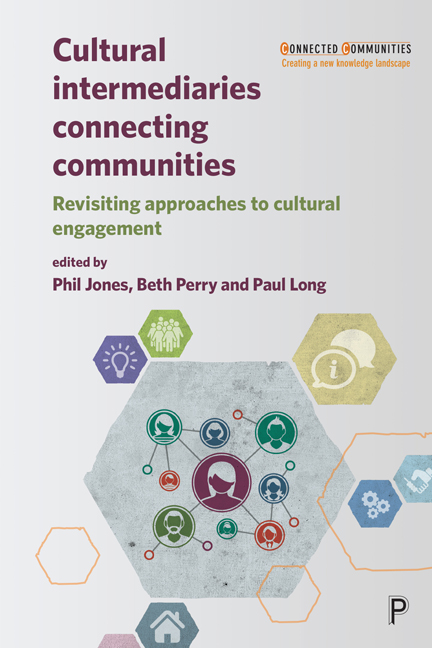Book contents
- Frontmatter
- Contents
- List of figures, tables and boxes
- Notes on contributors
- Acknowledgements
- Series editors’ foreword
- Introduction: Bringing communities and culture together
- Part One Changing contexts
- Part Two Practices of cultural intermediation
- Part Three Evaluation, impact and methodology
- Conclusion: where next for cultural intermediation?
- Index
seven - Governing the creative city: the practice, value and effectiveness of cultural intermediation
Published online by Cambridge University Press: 30 April 2022
- Frontmatter
- Contents
- List of figures, tables and boxes
- Notes on contributors
- Acknowledgements
- Series editors’ foreword
- Introduction: Bringing communities and culture together
- Part One Changing contexts
- Part Two Practices of cultural intermediation
- Part Three Evaluation, impact and methodology
- Conclusion: where next for cultural intermediation?
- Index
Summary
Introduction
Creative city policies have largely failed to deliver tangible benefits for deprived urban communities, with many noting the negative impacts of culture-led regeneration on specific city quarters (Chatterton, 2000; Miles, 2005; New Economics Foundation, 2005; May and Perry, 2018). It is increasingly recognised that mainstream cultural urban policy has not worked to deliver cultural democracy (Evrard, 1997; Jancovitch, 2011, 2017). In part this can be seen as a crisis of governance, characterised by a mismatch between structures, policies, values and beliefs underpinned by a series of contrasting narratives.
On the one hand, the narrative of the creative city presumes a strong state and a cultural urban policy that invests in flagship projects aimed at harnessing professionalised ‘culture’, narrowly defined, for primarily economic growth objectives. A model of governance is prioritised that focuses on public-private partnerships and networks as mechanisms to steer and control cultural policy. For Peck (2005: 740-1), the contemporary spread of creativity strategies perfectly works with ‘the grain of extant neoliberal development agendas, framed around interurban competition, gentrification, middle-class consumption and place-marketing’. This produces a top-down, cookie-cutter approach to the creative urban economy (Oakley, 2006) even though these approaches based on directive planning are seen as most likely to fail (Scott, 2008).
Orthodox approaches to governance have been drawn from models of urban policy which frame the creative city wholly in terms of the relationship between creative industries and economic growth, generating a highly controlled culture (Vickery, 2007). It has been widely noted both that top-down models of urban policy are unsuited for the development of the cultural urban economy and that existing initiatives and creative city policies have had little impact on deprived communities in urban areas. Florida's creative class, it is argued, reinforces the ‘cult of urban creativity’ (Peck, 2005: 742) comprising ‘cauldrons of neoliberal gangs’ (Krätke, 2009: 139), despite the fact that ‘creativity is also a major survival resource for the working poor in the diverse urban worlds of contemporary capitalism’ (Krätke, 2009: 139). Culture is seen as a luxury which only counts if it can be commercialised or translated into a creative industry (Pratt and Jeffcut, 2009).
This critique of the status quo and formal models of cultural urban policy leads to the conclusion that existing models have not worked (Flew, 2012: 154).
- Type
- Chapter
- Information
- Cultural Intermediaries Connecting CommunitiesRevisiting Approaches to Cultural Engagement, pp. 119 - 132Publisher: Bristol University PressPrint publication year: 2019



